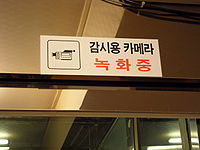Difference between revisions of "는 중이다"
From Korean Wiki Project
DigitalSoju (Talk | contribs) (New page: '''Verb + 는 중이다''' : This pattern is equivalent to '''(I am) in the middle of ~'''. It is used to describe what you are currently doing or in the middle of doing. ==Conjugation Ex...) |
(→Sentence Examples) |
||
| (12 intermediate revisions by 2 users not shown) | |||
| Line 1: | Line 1: | ||
| − | '''Verb + 는 중이다''' : This pattern is equivalent to '''(I am) in the middle of ~'''. It is used to describe what you are currently doing or in the middle of doing. | + | ==Description== |
| + | [[Image:사용중.JPG|thumb|right|200px|사용중 means it is being used.]] | ||
| + | [[Image:녹화중.JPG|thumb|right|200px|녹화중]] | ||
| + | '''Verb + 는 중이다''' : This pattern is equivalent to '''(I am) in the middle of ~'''. It is used to describe what you are currently doing or in the middle of doing. 중 <[[中]]> is a [[hanja]] character that literally means middle. So you are saying you are doing something or in the middle of doing something. | ||
| − | == | + | ===Notes=== |
| − | * | + | *It is often abbreviated as just 중. |
| + | **밥 먹는 중이다 → 밥 먹는 중 | ||
| + | *Noun + 중 form also exists. | ||
| + | **사용중 = 사용하는 중 | ||
| + | {{-}} | ||
| + | ==Conjugation Rule== | ||
| + | {{Conjugation table | ||
| + | |Pattern1=Verb + 는 중이다 <!--No 받침 pattern--> | ||
| + | |Examples1= <!--Examples, use <br> between each example--> | ||
| + | |Pattern2=Verb + 는 중이다 <!--받침 example pattern--> | ||
| + | |Examples2= <!--Examples, use <br> between each example--> | ||
| + | }} | ||
==Sentence Examples== | ==Sentence Examples== | ||
| − | + | {{Example table | |
| − | + | |Korex1 = 공사중 | |
| − | == | + | |Engex1 = Under Construction |
| − | + | |Comment1 = | |
| + | |Korex2 = 불러오는 중... | ||
| + | |Engex2 = Loading... | ||
| + | |Comment2 = | ||
| + | |Korex3 = 근무 중 이상무 | ||
| + | |Engex3 = | ||
| + | |Comment3 = millitry | ||
| + | |Korex4 = 회의 중에는 휴대전화를 꺼주십시오. | ||
| + | |Engex4 = Turn off the cell phone during the meeting. | ||
| + | |Comment4 = formal | ||
| + | |Korex5 = 얘기 중에 끼어들어서 미안합니다. | ||
| + | |Engex5 = I'm sorry to interrupt during talk. | ||
| + | |Comment5 = | ||
| + | |Korex6 = 산을 오르던 중에 잠시 쉬기로 했다. | ||
| + | |Engex6 = | ||
| + | |Comment6 = | ||
| + | |Korex7 = 여행하던 중에 그녀를 만났다. | ||
| + | |Engex7 = I was traveling in met her. | ||
| + | |Comment7 = | ||
| + | |Korex8 = 지금 통화 중인데, 조금 이따가 다시 얘기해요. | ||
| + | |Engex8 = | ||
| + | |Comment8 = | ||
| + | |Korex9 = 좀 조용히 해봐, 생각 중이니까. | ||
| + | |Engex9 = Shut up, I'm trying to think. | ||
| + | |Comment9 = | ||
| + | |Korex10 = 입원 중에는 푹 쉬어야지. | ||
| + | |Engex10 = | ||
| + | |Comment10 = [[Category:Incomplete examples]] | ||
| + | }} | ||
==Pronunciation== | ==Pronunciation== | ||
*Special pronunciation rule? | *Special pronunciation rule? | ||
| + | |||
| + | |||
==See Also== | ==See Also== | ||
*[[V + 고있다]] | *[[V + 고있다]] | ||
| − | [[Category:SNU | + | [[Category:Grammar|ㄴ]] |
| + | [[Category:SNU level 3 grammar|ㄴ]] | ||
| + | [[Category:Verb grammar pattern|ㄴ]] | ||
Latest revision as of 20:24, 24 May 2013
Description
Verb + 는 중이다 : This pattern is equivalent to (I am) in the middle of ~. It is used to describe what you are currently doing or in the middle of doing. 중 <中> is a hanja character that literally means middle. So you are saying you are doing something or in the middle of doing something.
Notes
- It is often abbreviated as just 중.
- 밥 먹는 중이다 → 밥 먹는 중
- Noun + 중 form also exists.
- 사용중 = 사용하는 중
Conjugation Rule
| Pattern | Case | Example | |
|---|---|---|---|
| Rule 1: | Verb + 는 중이다 | If there is no 받침 or if the adjective/verb stem has ㄹ as a 받침 | |
| Rule 2: | Verb + 는 중이다 | If there is a 받침 at the end of the adjective/verb stem |
Sentence Examples
| Korean | English | Notes |
|---|---|---|
| 공사중 | Under Construction | |
| 불러오는 중... | Loading... | |
| 근무 중 이상무 | millitry | |
| 회의 중에는 휴대전화를 꺼주십시오. | Turn off the cell phone during the meeting. | formal |
| 얘기 중에 끼어들어서 미안합니다. | I'm sorry to interrupt during talk. | |
| 산을 오르던 중에 잠시 쉬기로 했다. | ||
| 여행하던 중에 그녀를 만났다. | I was traveling in met her. | |
| 지금 통화 중인데, 조금 이따가 다시 얘기해요. | ||
| 좀 조용히 해봐, 생각 중이니까. | Shut up, I'm trying to think. | |
| 입원 중에는 푹 쉬어야지. |
Pronunciation
- Special pronunciation rule?

